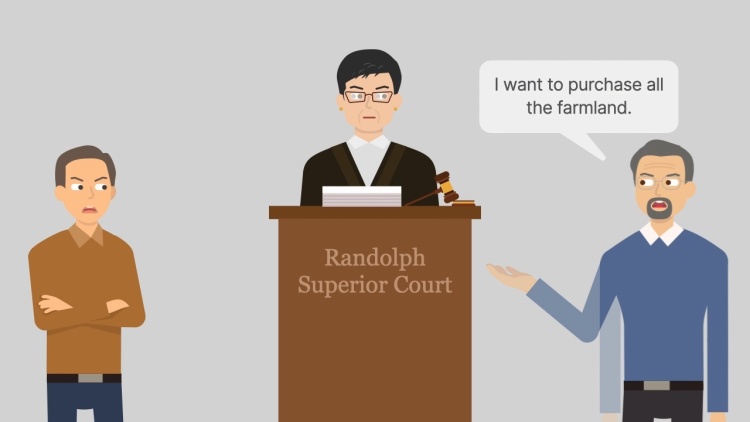Morris v. Morris
Court of Appeals of Georgia
637 S.E.2d 838 (2006)
- Written by Lauren Petersen, JD
Facts
In 1966, E.E. Morris purchased a 548-acre farm. In 1993, he entered into an agreement with his son, Harold Morris (defendant), to lease the entire farm for five years. Eight months into the lease, E.E. Morris and Harold Morris executed a contract giving Harold Morris the option to buy his father’s farm in 10 years. E.E. Morris died in 1997, and another of his sons, Marion Morris, became the executor of E.E. Morris’s estate (the estate) (plaintiff). In 2003, Harold Morris notified Marion Morris that he intended to exercise his option to buy the farm. However, the option agreement did not describe all 548 acres of E.E. Morris’s farm. Instead, it described only 312 acres of the farm. The estate filed an action for declaratory judgment, asking the court to determine how many acres E.E. Morris’s estate must sell to Harold Morris. At trial, both Harold Morris and Marion Morris testified that they had discussed the option contract with E.E. Morris and that E.E. Morris had unambiguously intended to give Harold Morris an option to purchase the entire farm. A secretary to the lawyer who drafted the option contract testified that while typing the contract she had inadvertently omitted the remaining 236 acres. Harold Morris requested that the trial court revise the option contract to include the missing 236 acres. The trial court held that the parties to the option contract had made a mutual mistake, because the parties had intended for the option contract to include all 548 acres of E.E. Morris’s farm. The estate appealed. On appeal, the estate argued that the trial court erred when it allowed testimony from Harold Morris and the secretary in regard to what property the option was intended to include.
Rule of Law
Issue
Holding and Reasoning (Johnson, J.)
What to do next…
Here's why 906,000 law students have relied on our case briefs:
- Written by law professors and practitioners, not other law students. 47,100 briefs, keyed to 995 casebooks. Top-notch customer support.
- The right amount of information, includes the facts, issues, rule of law, holding and reasoning, and any concurrences and dissents.
- Access in your classes, works on your mobile and tablet. Massive library of related video lessons and high quality multiple-choice questions.
- Easy to use, uniform format for every case brief. Written in plain English, not in legalese. Our briefs summarize and simplify; they don’t just repeat the court’s language.





